|
|
|
Sort Order |
|
|
|
Items / Page
|
|
|
|
|
|
|
| Srl | Item |
| 1 |
ID:
192195
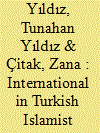

|
|
|
|
|
| Summary/Abstract |
This study examines Islamist understanding of change in the international system by inquiring into the conception of the international in Turkish Islamist tradition. It relies on a discourse analysis of Islamist journals’ entire corpus in Turkey from the 1940s to the 2010s. Its founding premise is that the Islamist prescription of change in the international system revolves around the notion of Pan-Islamism. This study first builds on an examination of the five ideological grounds of Pan-Islamism: dogmatic, historical, conjunctural, pragmatic/practical, and emancipatory. It further discusses the embodiment of Pan-Islamism at its two ends: pluralist/thin and monist/thick visions of Pan-Islamism. The analysis brings forth four main findings: First, notwithstanding its persistent claims to authenticity, the Pan-Islamist proposal is a synthetic conception of the international, combining authentic concepts, e.g. the umma, with such conventional concepts as balance of power, understood primarily in terms of alliances and blocs. Second, it does not purport to a significant questioning of the ordering principles of international relations, notably sovereignty and territoriality. Third, the Pan-Islamist proposal is, for the most part, power- and hegemony-oriented, amid its overinflated normative baggage and self-proclaimed anti-imperialism. Fourth, it mainly offers a change in the international rather than a change of the international, therefore discrediting any emancipatory potential it has claimed.
|
|
|
|
|
|
|
|
|
|
|
|
|
|
|
|
| 2 |
ID:
190111
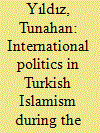

|
|
|
|
|
| Summary/Abstract |
This article will discuss the early discourse of Islamism on international politics in Cold War Turkey. It brings forth four main findings. First, while Islamists bandwagoned onto the discourse of the Turkish state and the Western bloc in presenting the Soviet Union as a national and global threat, they also sought to operationalize their anti-Sovietism for their broader political agenda. Second, Islamists effectively committed to the Western bloc during the period, but this commitment was replaced by anti-Westernism particularly from the mid-1960s onwards. Third, they substantially discussed decolonization with Pakistan, Palestine, and Algeria at the forefront, but their treatment of decolonization oscillated between glorification and devaluation and never paved the way for a Third-Worldist approach. Fourth, while pan-Islamism had an important place in their thinking, it came along with a commitment to the states-system as well as Turkey’s Cold War alliance, a retreat from classical Islamic concepts, and a conception of Turkish exceptionalism. In so doing, this article shows how the course of the Cold War shaped Islamism. It also demonstrates the pragmatism and eclecticism of Islamism. It is equally evident that Islamism was developed in interaction with, not in opposition to, nationalism and the discourse of national interest.This article will discuss the early discourse of Islamism on international politics in Cold War Turkey. It brings forth four main findings. First, while Islamists bandwagoned onto the discourse of the Turkish state and the Western bloc in presenting the Soviet Union as a national and global threat, they also sought to operationalize their anti-Sovietism for their broader political agenda. Second, Islamists effectively committed to the Western bloc during the period, but this commitment was replaced by anti-Westernism particularly from the mid-1960s onwards. Third, they substantially discussed decolonization with Pakistan, Palestine, and Algeria at the forefront, but their treatment of decolonization oscillated between glorification and devaluation and never paved the way for a Third-Worldist approach. Fourth, while pan-Islamism had an important place in their thinking, it came along with a commitment to the states-system as well as Turkey’s Cold War alliance, a retreat from classical Islamic concepts, and a conception of Turkish exceptionalism. In so doing, this article shows how the course of the Cold War shaped Islamism. It also demonstrates the pragmatism and eclecticism of Islamism. It is equally evident that Islamism was developed in interaction with, not in opposition to, nationalism and the discourse of national interest.
|
|
|
|
|
|
|
|
|
|
|
|
|
|
|
|
| 3 |
ID:
152702
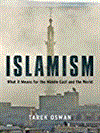

|
|
|
|
|
| Publication |
New Haven, Yale University Press, 2016.
|
| Description |
xx, 304p.hbk
|
| Standard Number |
9780300197723
|
|
|
|
|
|
|
|
|
|
|
|
Copies: C:1/I:0,R:0,Q:0
Circulation
| Accession# | Call# | Current Location | Status | Policy | Location |
| 059022 | 320.557/OSM 059022 | Main | On Shelf | General | |
|
|
|
|
| 4 |
ID:
137422
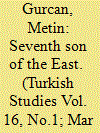

|
|
|
|
|
| Summary/Abstract |
Although Sezai Karakoç has been a prominent figure in the Turkish intellectual life for almost five decades, nothing scholarly has appeared so far to introduce him to the Western academia. Aside from his being considered to be one of the greatest Turkish poets in the twentieth century, for many, he is also an influential intellectual who has put his mark on Turkish Islamism and affected the Islamic community as deep as Mehmet Akif Ersoy and Necip Fazıl Kısakürek. Mainly because of his deliberate choice of being low profile and his distanced attitude towards media, he is not a widely known figure in the popular political arena. His ideas, however, have influenced many politicians in the contemporary Turkish Politics, particularly the elite cadres of currently running the Justice and Development Party (JDP). It is appealing to notice that a great number of policies he formulated in 1980s and 1990s have been developed and implemented by the JDP government. To elucidate Sezai Karakoç's intellectual depth and cultural vision, this study, first, introduces him, then opens up his conceptualization of civilization the grasp of which seems to constitute a fertile ground for the JDP's political rhetoric both for domestic and regional audiences, and lastly reveals his “doctrine of revival.”
|
|
|
|
|
|
|
|
|
|
|
|
|
|
|
|
| 5 |
ID:
151682
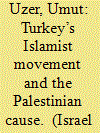

|
|
|
|
|
| Summary/Abstract |
The city of Jerusalem and the Palestine cause have been internalized by Islamist movements throughout the world as a pan-Islamic issue. Turkey’s Islamist movement, or the National Outlook Movement as it is known, has similarly appropriated Jerusalem as a cause to be defended against what it sees as Israeli encroachments. On two occasions in 1980 and 1997, the National Salvation Party and the Welfare Party, representing the Islamist movement, organized political demonstrations or events to highlight the significance of Jerusalem for the Muslim community and used it as an excuse to demand the introduction of Islamic law in an ardently secular country. These endeavours resulted in a backlash from the military, toppling the governments in power due to political instability and a purported threat to the secular nature of the regime.
|
|
|
|
|
|
|
|
|
|
|
|
|
|
|
|
| 6 |
ID:
161480
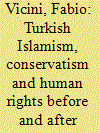

|
|
|
|
|
| Summary/Abstract |
Focusing on Mazlumder, an Islamist human rights organization, the paper sheds light on the complex articulation of Islamism and human rights discourse in post-2002 Turkey. Based on fieldwork and on the analysis of the organization’s press releases and reports on controversial public issues such as the Gezi protests, the paper argues that Mazlumder’s effort should not be read through normative lenses that reduce the issue to a matter of compatibility between Islam and human rights, and suggests that the analysis should instead take into account the positional shifts of the conservative front in relation to recent internal and external turmoil.
|
|
|
|
|
|
|
|
|
|
|
|
|
|
|
|
|
|
|
|
|